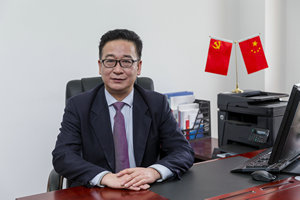- About
- News & Events
- Schools
- Research
- Campus
- Global SUIBE

Born in Shanghai in July 1963, Professor Zhang Daofang is Vice President of SUIBE. He has a Ph.D. in engineering and is a Ph.D. supervisor.
Previously, he served as vice dean and dean of the School of Environment and Architecture at the University of Shanghai for Science and Technology (USST), director of Science and Technology Administration at USST, executive vice director of the Institute of Collaborative Innovation at USST, vice president of USST, president of Shanghai Medical Device College, and vice president of Shanghai University of Medicine and Health Sciences. Concurrently, he is an executive member of the Chinese Society for Environmental Sciences, a standing member of the 12th and 13th Shanghai Municipal Committee of the Chinese People’s Political Consultative Conference (CPPCC), and a standing member of the 11th and 12th Yangpu District Committee of CPPCC.
His research interests include water pollution control engineering, water and environmental engineering, resourcization of solid waste and process, indoor and outdoor air pollution control and reduction. Over the years, he has led and completed over 20 national and municipal programs for science and technology development and 6 municipal demonstration projects promoting the transformation of scientific and technological achievements. He has over 100 academic papers published in prestigious journals both at home and abroad, 5 invention patents and 6 utility patents, and 3 scholarly books to his credit.
He is the recipient of many prizes and awards, including the 3rd Prize in the 10th Shanghai Award for Research Achievements in Decision-making Consultation (2015), the Shanghai May-Fourth Medal for the Youth (2012), the Distinguished Teacher Award in Services for the Shanghai Expo (2011), the 1st Prize in the Shanghai Award for Progress in Science and Technology (2006), the Award for the Ten National Science and Technology Achievements in Construction (2005), the Shanghai YucaiEducation Award (2004), and the Shanghai Commission of Science and Technology Award for Progress in Science and Technology (2001).